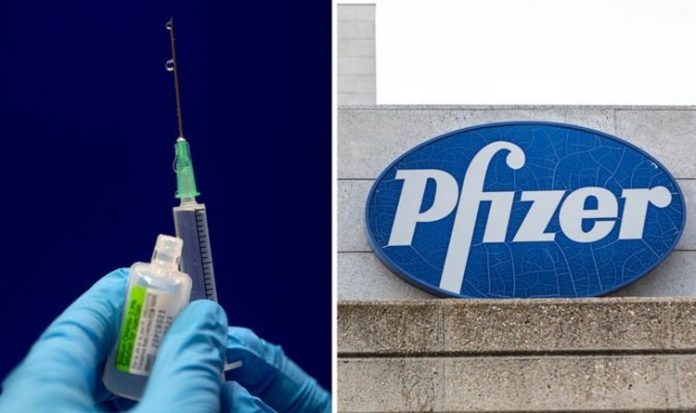Several thousands of people will likely receive the first of the UK’s Covid vaccines prior to Christmas this year. Currently, the only vaccine to be approved by the UK’s regulatory body is the Pfizer/BioNTech vaccine. The first patient to receive the Pfizer/BioNTech vaccine this week was 90-year-old Margaret Keenan, who said the vaccine was the “best early birthday present” in anticipation of her 91st birthday next week.
How many Pfizer vaccines has the UK bought?
In total the UK Government has secured 40 million doses of the Pfizer/BioNTech vaccine.
The vaccine has to be given in two doses, at least 21 days apart, so the UK has currently ordered enough supplies of the Pfizer vaccine to vaccinate 20 million people.
The first 800,000 batches of the vaccine were distributed to several dozen hospital hubs across the UK earlier this week.
Further batches of the Pfizer/BioNTech vaccine are expected to arrive before the end of the year.
READ MORE: ‘You should not have the vaccine’ if you have allergies says expert
Hospital inpatients and patients being discharged who are over the age of 80 have been among the first to get the vaccine in the UK this week, along with some health and care staff.
There are some logistical challenges to rolling out the Pfizer/BioNTech vaccine to care homes, due to the -70C conditions the vaccine needs to be stored in.
England’s Deputy Chief Medical Officer Professor Jonathan Van-Tam suggested the Oxford/AstraZeneca vaccine could be deployed more easily into care homes than the Pfizer/BioNTech vaccine, and the Oxford vaccine awaits approval.
When more vaccines become available, it is likely the Government will vaccinate those within the nine groups listed as a priority by the JCVI.
The priority groups listed by the JCVI are thought to account for 90 to 99 percent of people at risk of dying from Covid-19.
People not included in these priority groups could start to receive Covid vaccinations later in 2021.
In recent days the first vaccines have started to be administered, and two NHS staff members who received the jab on Tuesday had allergic reactions after receiving the vaccine.
The head of the UK’s Medicines and Healthcare products Regulatory Agency (MHRA) has stated people with a history of significant allergic reactions should not receive the Pfizer/BioNTech vaccine.
The NHS defines anaphylaxis as a severe and potentially life-threatening reaction to a trigger such as an allergy.
Dr June Raine said: “Any person with a history of anaphylaxis to a vaccine, medicine or food should not receive the Pfizer BioNTech vaccine.
“A second dose should not be given to anyone who has experienced anaphylaxis following administration of the first dose of this vaccine.
“Anaphylaxis is a known, although very rare, side effect with any vaccine.
“Most people will not get anaphylaxis and the benefits in protecting people against Covid-19 outweigh the risks.”
Dr Raine added the public “can be completely confident” that the Pfizer/BioNTech vaccine has met the MHRA’s “robust standards of safety, quality and effectiveness”.







